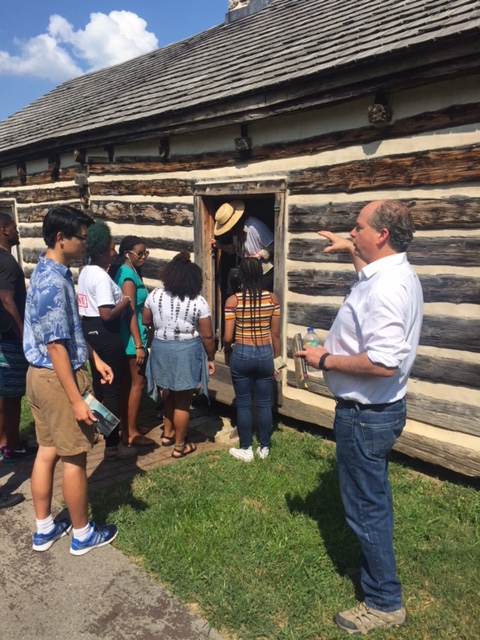Home » Historic Black Nashville » Hermitage Site Visit
Hermitage Site Visit
Posted by anderc8 on Tuesday, October 25, 2016 in Historic Black Nashville, News.
 In September, the students of Historic Black Nashville visited the Hermitage to gain a deeper understanding of the history of slavery on the plantation. A sampling of student-penned blog posts can be found below.
In September, the students of Historic Black Nashville visited the Hermitage to gain a deeper understanding of the history of slavery on the plantation. A sampling of student-penned blog posts can be found below.
Max Martineau
Senior
Economics & Public Policy major
I think one of the really interesting things to think about is that although thousands of original documents written by or to Andrew Jackson have survived to the present, the majority of people who lived at The Hermitage did not write a single word. I think that it is really important to work to understand what aspects of history have been silenced for one reason or another, and try to better understand them. Often not considered important enough to mention in the writings of others, their names are rarely encountered beyond bills of sale, runaway notices and passing observations. The only evidence of existence they left behind were the footprints of vanished buildings, discarded or lost objects, and, most notably, their impact on the land. We spoke a lot about the lack of an official and proper burial ground, and that is just another example of history being silenced. Part of what really excites me about this class is being able to research and understand some of Nashville’s lesser-known history. I think it is important that we as Vanderbilt students to our part to uncover and understand more about those who came before us, and how history shapes the city that we all live in.
Andriana Johnson
Sophomore
Major undeclared
Dr. McKee didn’t just offer the typical narrative that is typically detailed in history books. He did an excellent job, in my opinion, of providing a perspective that is more in line with that of actual slave life on a plantation. I liked how he responded to the woman’s question of whether or not Andrew Jackson was a brutal landowner. His assertion that that was a tricky question because it is debatable that anyone who owns people could be seen as “kind” was, I felt, a very appropriate response because many historians and history books would likely venture that he indeed was kind. I really felt that that was a powerful experience to walk the same grounds as people who were in bondage and treated as property, especially as an African American myself. It was a very sobering experience for me and served as a reminder of all that I take for granted every day. This was really manifested when I walked into a slave cabin and saw firsthand the living conditions that entire families were subject to. To put things in perspective, the entire cabin was approximately the size of my college dorm room! It honestly rendered me speechless to see what people had to go through, but also in a way made me proud of the strength and resilience of my people.
Bree’ara Murphy
Freshman
Environmental Science & Public Policy major
Once we proceeded away from the museum building and onto the plantation grounds near the mansion where Jackson resided, I began to feel a sense of the true nature of the grounds. I imagined life back in the 1800s for a slave, living in one of the cabins, under the constant gaze of Jackson and overseers. I was intrigued by the architecture of the mansion and its proximity to the slave quarters. The way the mansion is designed, it almost derides the simplicity and ruggedness of the slave cabins. Its grandiose nature, even in the back, would be a constant reminder to the slaves that Jackson was above them in all ways. When our guide was explaining the bell that anyone inside the house could ring and have a slave come to their aid immediately, I was taken aback by how demanding it all must have been. The slaves had virtually no direction in life outside the routine of always being ready to obey the master’s command. We know, however, that the slaves led lives of their own, and made time to be social with one another when they could.
Leoncia K. Gillespie
Freshman
Biology major
Overall, the visit to the Hermitage was uncomfortable, but necessary. It showed why archaeological and archival research is important. Knowledge of the products of this work allows one to visit a place like the Hermitage and ask questions about why the kitchen was a separate entity from the house. What or who could be buried beneath the paved parking lot? Why didn’t slaves like Fernando/Polydore revolt if they had access to firearms? Why do people get to marvel at the beauty of a place that was once responsible for diminishing human beings to the status of mere chattel? It is easy to admire what is in plain sight. However, acquisition of the true narratives of our history requires excavation of land, literature, and original documentation. The visit to the Hermitage evinced the need for greater research efforts, even on places and narratives with which we seem to be familiar.

©2024 Vanderbilt University ·
Site Development: University Web Communications